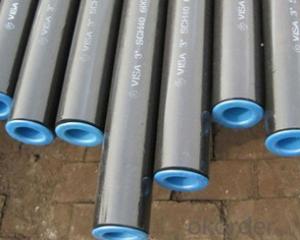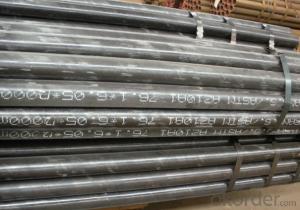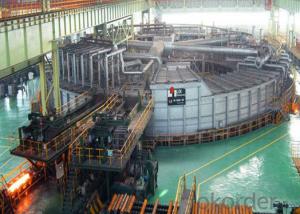High-quality Carbon Seamless Steel Pipe For Boiler CNBM
- Loading Port:
- Qingdao
- Payment Terms:
- TT OR LC
- Min Order Qty:
- 10 pc
- Supply Capability:
- 30 pc/month
OKorder Service Pledge
OKorder Financial Service
You Might Also Like
Quick Details
| Thickness: | 3 - 60 mm | Section Shape: | Round | Outer Diameter: | 21.3 - 1220 mm |
| Secondary Or Not: | Non-secondary | Application: | fluid pipe,boiler pipe, structural pipe, oil/gas/water pipe etc | ||
| Technique: | Hot Rolled | Certification: | ISO9001-2000, ISO14000, ISO18000 , API 5L | Surface Treatment: | Painted, Oiled, galvanized or phosphate etc |
| Special Pipe: | API Pipe | Alloy Or Not: | Is Alloy | Technique:: | Hot rolled or cold rolled |
| Special pipe:: | API/ ASME/thickwall/oil/gas/water pipe | Length:: | 3-12m | Treatment of two ends:: | Beveled end , plain end etc |
| Brand:: | Bai Chuan | Third Party Inspection:: | BV, SGS etc. | Schedule:: | SCH10-SCH160, XS, XXS |
| Other Material:: | 10#, 20#, 16Mn, Q345 etc | Material Type:: | Carbon steel/ Low alloy steel | Producing standard:: | American/Japanese/ German/ Britain/ Chinese standard |
| Grade: | A53(A,B),A106(B,C),A210,API J55,St37,STPG42,A53-A369,API J55-API P110,ST35-ST52 | Standard: | BS EN10296,JIS G3452-2004 |
1. Out Diameter: | 21.3mm-1220mm |
2. Wall Thickness: | 3mm-60mm |
3. Length: | 3m-12m |
4. Producing Standard: |
|
5. Main Material: (Carbon Steel & Low Alloy steel) |
|
6. Special specifications: | Available according to customer’s requirements and quantity. |
7. End Shape: | Beveled end , plain end, varnished, or adding plastic caps to protect the two ends as per customer’s requirements. |
8. Surface treatment: | Painted, Oiled, galvanized, phosphate etc. |
9. Usage: |
|
10. Certificates: | ISO9001-2000, ISO14000, ISO18000, API 5L certificate |
11. Third party inspection: | Welcome you to send a third party inspecting company (BV, SGS etc) to check the quality of our final products. |
12. Pictures: | our producing flow chart, our factory, production line, inspecting equipments, our products are listed below for your reference. |
- Q:Can steel pipes be used for water supply networks?
- Yes, steel pipes can be used for water supply networks. Steel pipes are commonly used in water supply systems due to their durability, strength, and resistance to corrosion. They are able to withstand high pressure and can safely transport water over long distances. Additionally, steel pipes are highly versatile and can be easily connected, making them suitable for various water supply network applications.
- Q:How do you determine the required support spacing for steel pipes?
- The required support spacing for steel pipes is determined based on several factors including the pipe material, size, weight, and operating conditions. Generally, industry standards and guidelines such as those provided by the American Society of Mechanical Engineers (ASME) are followed to calculate the appropriate spacing. These standards take into account factors such as pipe deflection, thermal expansion, vibration, and load-bearing capacity to ensure the pipes are adequately supported and do not experience excessive stress or deformation.
- Q:How are steel pipes transported from the manufacturing site to the construction site?
- Steel pipes are typically transported from the manufacturing site to the construction site through various means, including trucking, rail transportation, and sometimes even by barges or ships for longer distances. The chosen mode of transportation depends on factors such as the distance between the sites, the quantity and size of the pipes, and the available infrastructure.
- Q:Can steel pipes be used for transporting slurry?
- Yes, steel pipes can be used for transporting slurry. Steel pipes are known for their durability and strength, making them suitable for handling abrasive materials like slurry. The smooth interior surface of steel pipes helps to minimize friction and prevent clogging, ensuring efficient transportation of slurry. Additionally, steel pipes can withstand high pressure and are resistant to corrosion, making them a reliable choice for slurry transport.
- Q:Can steel pipes be used for steam applications?
- Yes, steel pipes can be used for steam applications. Steel pipes are known for their high strength and durability, making them suitable for carrying steam at high temperatures and pressures. They are resistant to corrosion and can withstand the harsh conditions of steam systems, making them a popular choice in various industries such as power generation, oil and gas, and chemical processing.
- Q:How are steel pipes protected against internal scaling?
- Steel pipes are protected against internal scaling through a process called internal coating or lining. This involves the application of a protective layer on the interior surface of the pipe to prevent the formation of scales or deposits. There are several methods used for this purpose. One common method is the application of epoxy coatings. Epoxy is a durable and corrosion-resistant material that forms a continuous barrier on the inside of the pipe. It helps to prevent the accumulation of minerals and other substances that can lead to scaling. Epoxy coatings are often applied by spraying or brushing onto the pipe's interior surface and then cured to form a hard and smooth finish. Another method used for protecting steel pipes against internal scaling is cement mortar lining. In this process, a layer of cement mortar is applied to the inside of the pipe. The cement mortar acts as a barrier against scaling and also provides additional protection against corrosion. This lining process is commonly used for large-diameter pipes that are used in water distribution systems. Polyethylene (PE) lining is another technique employed to protect steel pipes from internal scaling. PE lining involves the insertion of a high-density polyethylene liner into the pipe. This liner acts as a barrier against scaling and also helps to reduce friction, improving the flow of fluids through the pipe. PE lining is often used in applications where a smooth interior surface is required, such as in oil and gas pipelines. In addition to these methods, regular maintenance and cleaning of the pipes can also help prevent internal scaling. This may involve the use of chemical cleaning agents or mechanical cleaning techniques to remove any deposits that have formed on the pipe's interior surface. Overall, protecting steel pipes against internal scaling is crucial to maintain their efficiency and prolong their lifespan. By utilizing various coating and lining methods, as well as implementing proper maintenance practices, the risk of internal scaling can be significantly reduced.
- Q:Can steel pipes be used for underground stormwater systems?
- Yes, steel pipes can be used for underground stormwater systems. Steel pipes are durable and resistant to corrosion, making them a suitable choice for underground applications. Additionally, steel pipes can handle high volumes of stormwater, making them ideal for stormwater management systems.
- Q:Can steel pipes be used for electrical conduits?
- No, steel pipes are not typically used for electrical conduits as they are conductive and can pose a safety risk. Electrical conduits are usually made of non-conductive materials such as PVC or metal with insulating coatings.
- Q:How are steel pipes protected against rusting?
- Corrosion protection is employed to safeguard steel pipes from rusting. Various methods are utilized for preventing the formation of rust on steel pipes, including the following: 1. Coatings: To create a barrier against rust, different coatings are applied to the surface of steel pipes. These coatings prevent oxygen and moisture from reaching the metal surface and initiating the rusting process. Options for coatings include epoxy, polyethylene, zinc, or a combination of these materials. 2. Galvanization: Steel pipes are immersed in a molten zinc bath to undergo galvanization. This process forms a protective layer of zinc on the surface of the pipes, acting as a sacrificial barrier. If any small areas of the pipe surface are exposed, the zinc coating will corrode instead of the steel, providing continuous protection against rust. 3. Cathodic Protection: Electrical current is utilized to safeguard steel pipes in this method. By connecting the pipes to a sacrificial anode, usually made of zinc or magnesium, the anode will corrode instead of the steel pipes when exposed to moisture and oxygen. This method is commonly employed in underground or underwater applications. 4. VCI (Vapor Corrosion Inhibitor) Technology: Chemical compounds are used in VCI technology to release a vapor that protects steel pipes from rusting. These compounds form a thin layer on the surface of the pipes, inhibiting the corrosion process by neutralizing oxygen and moisture. 5. Regular Maintenance: Aside from the aforementioned methods, regular inspection and maintenance play a crucial role in preventing rust formation on steel pipes. This involves cleaning the pipes, removing any accumulated debris or corrosive substances, and repairing any damaged coatings or protective layers. In summary, these corrosion protection methods effectively ensure the longevity and durability of steel pipes in various industrial, commercial, and residential applications by safeguarding them against rusting.
- Q:What is the difference between carbon steel pipes and stainless steel pipes?
- The main difference between carbon steel pipes and stainless steel pipes lies in their composition and properties. Carbon steel pipes are primarily made of iron and carbon, with small amounts of other elements. They are less expensive, have higher tensile strength, and are suitable for transporting fluids and gases in various industries. On the other hand, stainless steel pipes contain iron, chromium, and other alloying elements. They are more expensive, have higher corrosion resistance, and are commonly used in applications where hygiene, durability, and aesthetic appeal are essential, such as in the food, pharmaceutical, and architectural industries.
1. Manufacturer Overview |
|
|---|---|
| Location | |
| Year Established | |
| Annual Output Value | |
| Main Markets | |
| Company Certifications | |
2. Manufacturer Certificates |
|
|---|---|
| a) Certification Name | |
| Range | |
| Reference | |
| Validity Period | |
3. Manufacturer Capability |
|
|---|---|
| a)Trade Capacity | |
| Nearest Port | |
| Export Percentage | |
| No.of Employees in Trade Department | |
| Language Spoken: | |
| b)Factory Information | |
| Factory Size: | |
| No. of Production Lines | |
| Contract Manufacturing | |
| Product Price Range | |
Send your message to us
High-quality Carbon Seamless Steel Pipe For Boiler CNBM
- Loading Port:
- Qingdao
- Payment Terms:
- TT OR LC
- Min Order Qty:
- 10 pc
- Supply Capability:
- 30 pc/month
OKorder Service Pledge
OKorder Financial Service
Similar products
New products
Hot products
Related keywords































